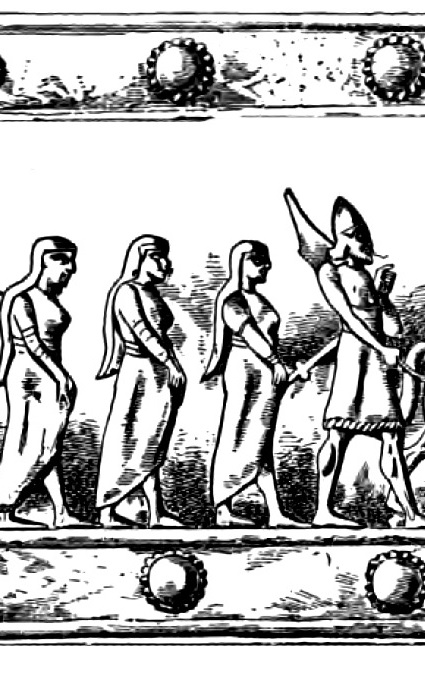This series grew out of our Colossians Greek Reading Videos. Each post expounds practical or devotional points from the text that become evident especially when translating directly from the Greek. We hope these posts help convince you that Greek matters!
Εἰ ἀπεθάνετε σὺν Χριστῷ ἀπὸ τῶν στοιχείων τοῦ κόσμου,
τί ὡς ζῶντες ἐν κόσμῳ δογματίζεσθε;
Colossians 2:20
There are two difficult elements of Greek grammar here, but, once sorted out, we see a powerful question posed to the Colossians.
The first four words are simple enough, “If you died with Christ…” But the following preposition ἀπό seems strange following the verb ἀποθνῄσκω, “to die”; what does it mean to “die from” something? As you can imagine, it means more to “die to” or with reference to something, but even more than that. According to BDAG, ἀποθνῄσκω with ἀπό means “through death become free from.” So the protasis of this clause (the “if” portion) states that the Colossians have, by virtue of their union with Christ in his death, become free from the στοιχεῖα.
This is no small point. Just earlier Paul said the false philosophy and empty deceit that is being propagated in Colossae is in accord with the στοιχεῖα (Col 2:8). And these are only one class of spiritual powers that Paul is concerned to claim that Christ is Lord over. There are also the “rulers and authorities” whom Christ created and defeated at the cross (1:16; 2:10; 2:15). These various kinds of spiritual powers invoke the spiritual power of Eph 2:2, the “authoritative ruler of the air” (or alternatively, “the ruler of the aerial authority”).
So in both Colossians and Ephesians there is great concern about the spiritual powers, especially that Christians are submitting themselves to precepts and teachings that are in accord with the spiritual powers, and not in accord with Christ as they were taught (2:8, 6). In Col 2:20, Paul now makes the heavy statement that they have been set free from the στοιχεῖα through the death of their “old man” (their existence in Adam).
The apodosis (the “then” portion) asks a question. He assumes the protasis is true: they have in fact been set free from the στοιχεῖα. Now, if that is true (and it is), why are they submitting themselves (δογματίζεσθε) to the false teaching that is in accord with the στοιχεῖα? Paul characterizes the submission in a certain way with a participial phrase, ὡς ζῶντες ἐν κόσμῳ.
This phrase is difficult and is the second of the two grammatical issues in this verse. Most translations render it “as if/though you were living in the world.” The idea is that ὡς with a participle in this case has a concessive force. But this doesn’t make much sense. A truly concessive rendering would be “why, although you are living in the world, are you submitting [to the false teaching]?” A concessive idea is contrary to the main verb; that is, the main verb happens in spite of the concessive idea. But that is not what’s going on with this phrase. The participial phrase ὡς ζῶντες ἐν κόσμῳ is consistent with submitting themselves to the false teaching, so it can’t be concessive.
A better translation is to take ὡς as expressing manner (a similar use of ὡς is found in Eph 3:5). The participial phrase modifies the verb δογματίζεσθε expressing the manner in which they submit themselves: in the manner of living in the world. Of course “living in the world” is used pejoratively here, not neutrally to mean simply existing on the earth. It’s equivalent to Paul’s typical phrase κατὰ σάρκα, “according to the flesh.” So Paul asks them, if you have been liberated from the στοιχεῖα, why are you still submitting yourselves to them as those who live fleshly?
This is a simple question with a complex answer. Christ created the spiritual powers, and he is therefore Lord over them (1:16). God disarmed them on the cross through Christ and led them in public, triumphal procession as his captives. The picture is one of bloodied and chained captives, being led in a train behind the victorious general. Strangely (to stick with the imagery), the general’s soldiers are bowing down to the chained captives, seeking their wisdom and precepts. What a ridiculous image.
But that’s exactly what Paul was going for. The Colossians are submitting to precepts, teachings, and philosophies that are in accord with the defeated στοιχεῖα, and that are in accord with the traditions of men, all of which serve in the end for the gratification of the flesh (2:23).
Peering into Paul’s mail to the Colossians confronts us with the same issue. Are we living ὡς ζῶντες ἐν κόσμῳ?
Are you living ὡς ζῶντες ἐν κόσμῳ? #GreekMatters Share on X
Are we submitting ourselves to worldly teachings that serve to gratify the flesh? Do we seek worldly goods, services, memberships, friends, entertainment, or relationships that only serve to gratify the flesh? If so, we’re no different than the Colossians, ridiculously submitting to the bloodied and chained captives while ignoring the triumphant Lord leading them in procession. Paul would exhort us:
Put to death therefore what is earthly in you: sexual immorality, impurity, passion, evil desire, and covetousness, which is idolatry. On account of these the wrath of God is coming (Col 3:5-6).
Rather, we should put on the new self, seek the things that are above where Christ is, and live according to the Spirit, not according to the flesh.
Watch our Greek Reading Video on Colossians 2:20-23.
See our other posts in the Greek Matters series.


